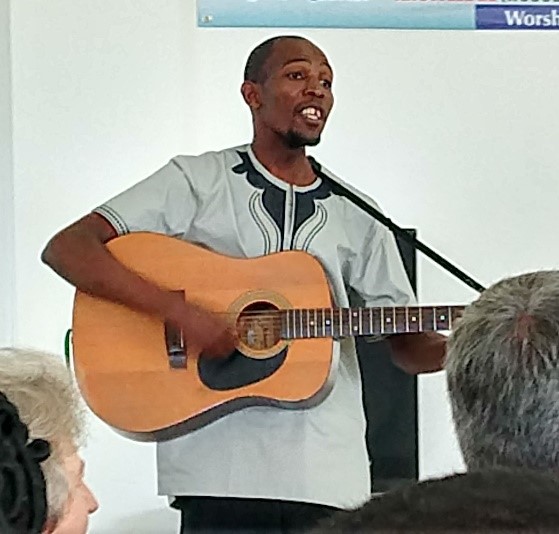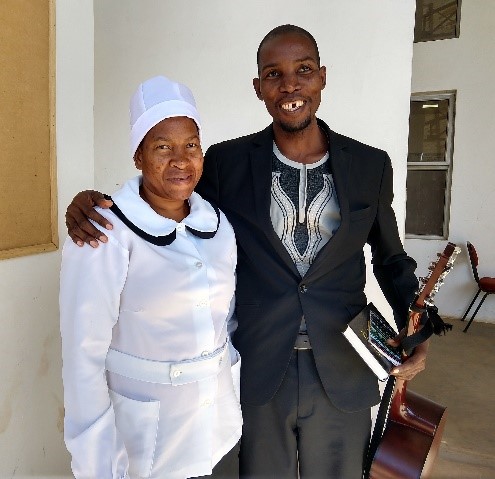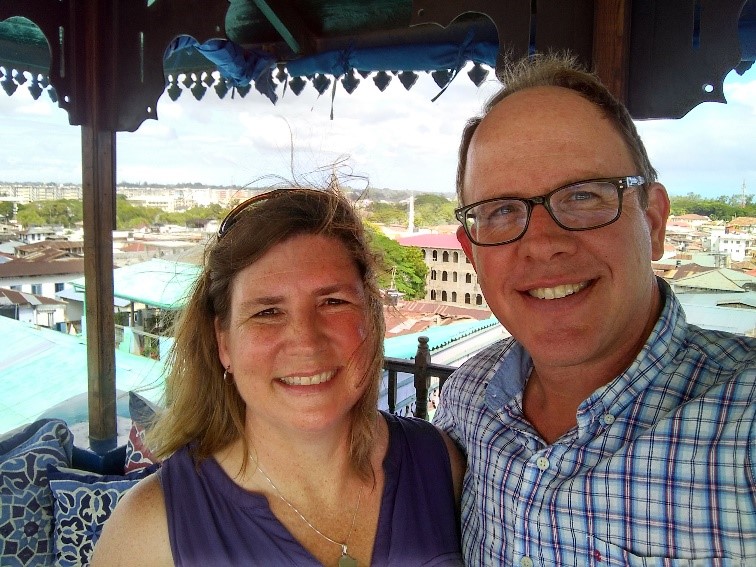A Letter from Dustin and Sherri Ellington, serving in Zambia
May 2019
Write to Dustin Ellington
Write to Sherri Ellington
Individuals: Give online to E200478 for Dustin and Sherri Ellington’s sending and support
Congregations: Give to D507543 for Dustin and Sherri Ellington’s sending and support
Churches are asked to send donations through your congregation’s normal receiving site (this is usually your presbytery)
Dear Friends,
Nine years ago, when Presbyterian World Mission first mentioned the idea of sending Sherri and me to Justo Mwale Theological College (now University), something that inspired us was hearing it plays a significant role in training pastors for a large section of Africa where the church has rapidly grown. It was explained that as World Mission staff looked at which seminaries were making the biggest impact training pastors for partner churches in numerous countries, Justo Mwale was among those at the top. Our school currently has students from seven African countries. I’d like to share about a student from Mozambique, José Bazima. [By the way, most of this conversation took place before cyclones Idai and Kenneth hit Mozambique. Thankfully, José’s family was not affected directly, as they live far from the cyclones’ paths, but Mozambique will be in need of prayer and international involvement for a long while.]
Ever since meeting him, I had been encouraged by José’s thoughtful comments in class and in the Bible study group I facilitate, but I knew I wanted to ask him more questions when he shared a simple song in chapel that really touched my faith. My experience with African Christians has been rich, and their powerful motivation to be of one heart and mind in service to their communities really challenges me. But it seems that only now and then have I heard personal expressions about Jesus, such as loving and serving him who, in the apostle Paul’s words, “loved me and gave himself for me” (Gal 2:20). That’s something I want for my students as they prepare to be pastors, so their relationship with Jesus Christ inspires and sustains their life of service. Let me share with you some of my conversation with José.Dustin: José, can you tell me why you chose to sing that song for our JMU community?
José: I chose that song because it’s the song I always sing when I’m alone. I compose many songs, including that one. It’s my favorite of the ones I’ve written. It says, “I love to serve Jesus because he is my Savior, and my life was saved by his blood.”
Dustin: What’s the song’s language?
José: I sang it in Changana, the language of my parents and of the province where they came from. They went to the capital, Maputo, in 1974 because of the civil war, when Mozambique was in transition from colonialism to independence. I also write songs in Ronga, the language of Maputo, where I was born, and I write songs in Portuguese as well.
Dustin: How did you start composing songs?
José: I had the opportunity to participate in some workshops on interpretation of songs written in the tonic sol-fa system when I was young. Through this I also developed skills of composing songs. When I was a leader in youth fellowship, I wrote songs to teach young people the content of the Christian faith. I even have a nickname back home because of one of the songs. People started calling me, “Xiyaxiyani,” which means “Examine!” It’s the title of a song that calls people to observe and examine what they will worship and serve. It says, “But us, we will worship and serve God, because of what he has done for us. He sent Jesus Christ to come and save us. And because of these things we serve and worship him.”
Dustin: As someone from Mozambique, how did you feel when you learned you would become a student at JMU in Zambia?
José: I was very happy. I thought maybe this is God’s answer for my prayers. In Zambia, I was given this opportunity to learn theology and English language as well. I had prayed for both the chance to learn English and to study theology… Everyone needs skills to communicate in English due to globalization.
Dustin: What do people in Mozambique think of you studying here at JMU and in Zambia?
José: My family especially is so glad — I’m the first one to do further studies toward a bachelor’s degree. My father and my mother are Christians and elders of the church, so they are so happy to see me pursuing this ministry and following the ways that they taught me. And for the church, it’s also very good. The church is expecting that when my wife and I finish this course, we will help there. I was talking recently with our church’s general secretary, and one of the things he told me is: “On your research papers, think about the situation that afflicts our church today.” So by this statement I realize that the church is expecting a lot from me.
Dustin: What are the biggest challenges facing the Presbyterian Church of Mozambique?
José: The main challenge is the proliferation of churches with a different doctrine, and Christians are influenced by these churches. These churches know that people need money and want to live “the good life.” So their theology focuses on God’s material blessings. They say, “If you come to my church, your life will change fast.” Our churches have worship at 9:00 or 10:00 on Sunday morning. But by evening our members are worshiping at a church that has these teachings to find what those churches promise. The people don’t want to leave the Presbyterian Church. But because of those churches, the influence is deep, and people have dual membership. The idea that God’s blessings come from another church is the main challenge that our church is experiencing. But of course no one local church has all of God’s blessings!
Dustin: What have you appreciated about your education and experience at Justo Mwale University so far?
José: The education is not focused just on the academic but also the devotional side. It prepares people to serve the church. I like that approach very much, bringing head and heart together.
Dustin: Can you tell us more about your dreams and vision for ministry in the future, and how your education at JMU will help your contribution to the church in Mozambique?
José: I will help people in my country by sharing what I’m getting here. Of course, I will do that at the congregation. But it can be done also in other institutions, like our United Seminary of Ricatla in Mozambique. We have but a few pastors with a bachelor’s degree. I know that if I finish my training here, I need to continue studying. Ricatla Seminary only offers a diploma, not a full bachelor’s degree. The church is trying to develop Ricatla. One of the important things is having people trained to teach there.
I feel privileged to get to teach and be blessed by students like José. Please hold Justo Mwale University in your prayers, that God will strengthen all of us who serve here to be faithful stewards of the opportunity we have to train pastors and teachers for Southern and Central Africa.
Sherri and I also appreciate prayer for ourselves, for us to abide in deep relationship with God that sustains us and our ministry. We also appreciate prayer for our sons Clay and Chris, now 21 and 16, as they finish their respective junior years of college and high school and discern what God has next for them. Moreover, I will be teaching an intensive seminary course in Lebanon May 18-31 and would appreciate prayer for that time of ministry. We also invite prayer for the three YAVs (Young Adult Volunteers from the PCUSA) in the home stretch of their “year of service for a lifetime of change” here in Zambia, and for Sherri’s final retreat with them in July.
Please know that we are grateful to all of you who support our ministry through PC(USA) World Mission. To give now, click here. To give toward scholarships for Presbyterian students to attend Justo Mwale from a variety of countries, click here, and write “JMU scholarships” in the comments/instructions. Thank you so much for your partnership with us!
Yours in Christ,
Dustin and Sherri Ellington
![]() You may freely reuse and distribute this article in its entirety for non-commercial purposes in any medium. Please include author attribution, photography credits, and a link to the original article. This work is licensed under a Creative Commons Attribution-NonCommercial-NoDeratives 4.0 International License.
You may freely reuse and distribute this article in its entirety for non-commercial purposes in any medium. Please include author attribution, photography credits, and a link to the original article. This work is licensed under a Creative Commons Attribution-NonCommercial-NoDeratives 4.0 International License.


